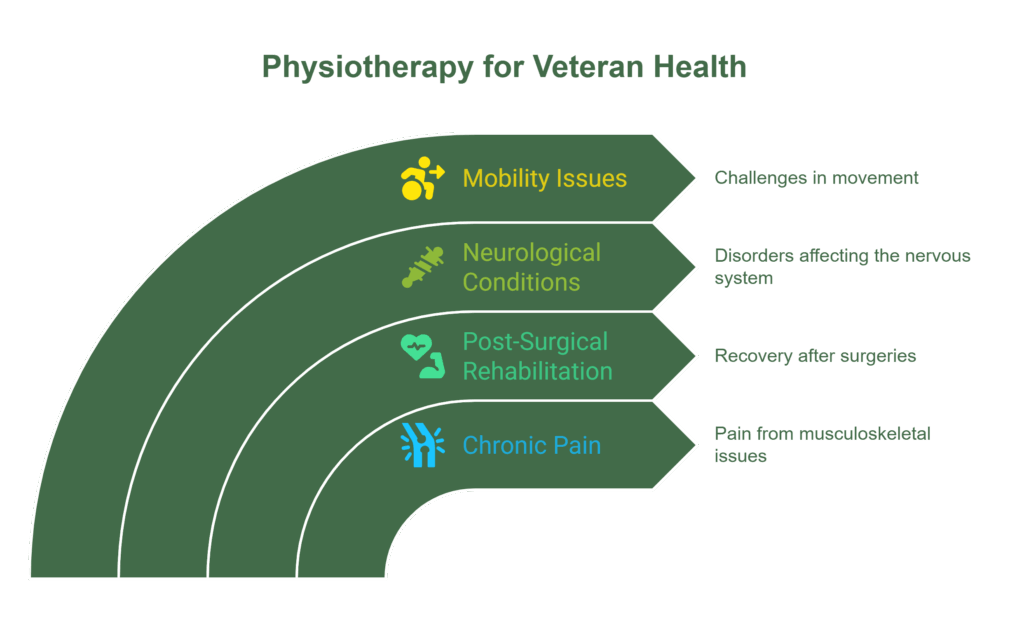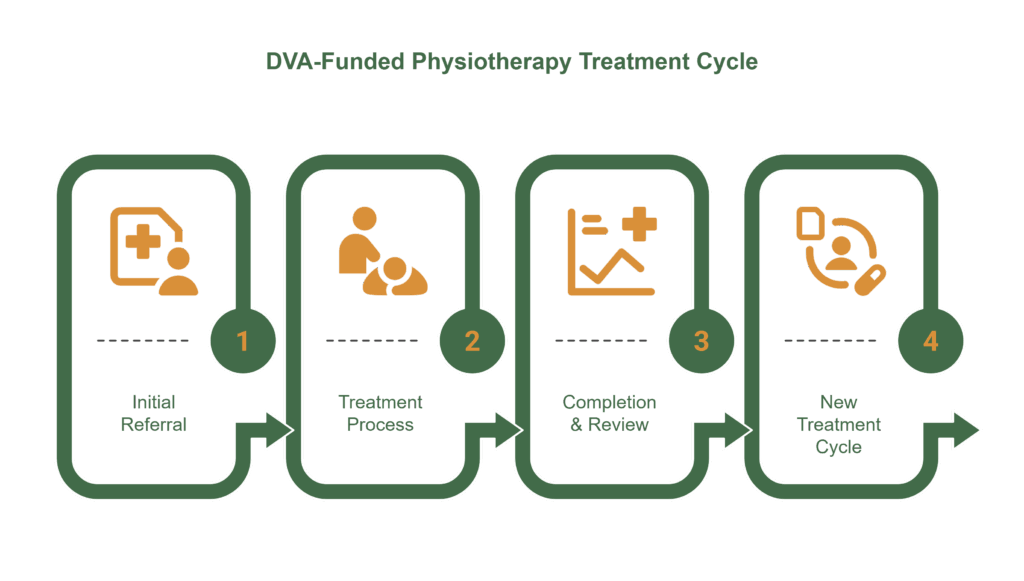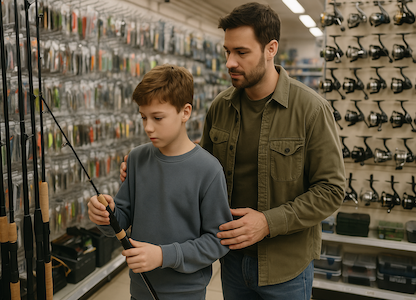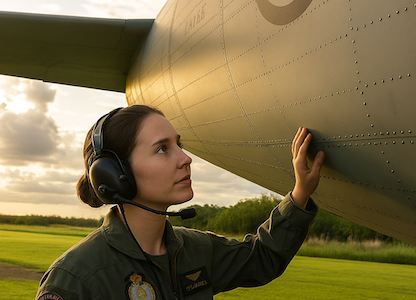For many Australian veterans, physiotherapy is not just about treating injuries—it’s a vital component of maintaining mobility, managing chronic pain, and improving overall quality of life. Having served their country, veterans often face physical challenges linked to their service, ranging from musculoskeletal injuries to long-term rehabilitation needs. Physiotherapy plays a crucial role in their ongoing healthcare, helping them regain movement, reduce discomfort, and stay active.
Recognising the importance of this support, the Department of Veterans’ Affairs (DVA) funds physiotherapy services for eligible veterans, ensuring they receive high-quality treatment without the financial burden. Through the DVA Health Card system, veterans can access physiotherapy tailored to their needs, whether for recovery, rehabilitation, or maintaining their independence.
Key takeaways
- DVA-funded physiotherapy supports eligible veterans in managing pain, improving mobility, and maintaining independence—at no personal cost.
- Gold Card holders receive full coverage for all necessary physiotherapy, while White Card holders are covered for accepted service-related conditions.
- Veterans can access care in clinics, at home, or via telehealth, depending on their mobility and location—ensuring support is available wherever it's needed.
- A referral from a GP or specialist is required to begin treatment, with a structured 12-session cycle that allows for ongoing care and progress tracking.
Understanding DVA-Funded Physiotherapy
DVA-funded physiotherapy is a government-supported healthcare service designed to assist eligible Australian veterans in managing pain, improving mobility, and enhancing their quality of life. It covers a wide range of physiotherapy treatments aimed at restoring function, preventing further injury, and helping veterans stay active and independent.
The Role of Physiotherapy in Veteran Health
Veterans often experience service-related injuries and long-term health conditions, including:
- Chronic pain from musculoskeletal issues, such as back pain, joint pain, or repetitive strain injuries.
- Post-surgical rehabilitation to restore movement and strength after procedures like knee or hip replacements.
- Neurological conditions, including balance disorders, stroke recovery, and nerve-related impairments.
- Mobility issues due to age-related degeneration, arthritis, or past injuries affecting movement.

By working with trained physiotherapists, veterans can receive targeted treatment plans that address their specific conditions, improving their ability to perform daily activities, reducing discomfort, and promoting overall physical well-being.
DVA funding ensures that eligible veterans can access clinic-based, home-based, and telehealth physiotherapy services without the financial strain of private healthcare costs. This initiative reflects Australia’s commitment to supporting those who have served, ensuring they receive the care they need to live healthier, more mobile lives.
Eligibility and Access
DVA-funded physiotherapy is available to eligible Australian veterans through the DVA Health Card system. Access to these services is determined by the type of DVA Health Card a veteran holds, which dictates the level of coverage provided.
DVA Health Card Holders: Gold, White, and Orange Cards
Veterans may hold one of three types of DVA Health Cards, each offering different levels of support for physiotherapy services:
- Gold Card: Provides full coverage for all medically necessary physiotherapy treatments, regardless of whether the condition is related to military service.
- White Card: Covers physiotherapy treatment only for accepted service-related conditions, meaning veterans must have their condition approved by the DVA before receiving funded care.
- Orange Card: This card is for pharmaceutical benefits only and does not provide coverage for physiotherapy services.
Steps to Access DVA-Funded Physiotherapy
To begin physiotherapy treatment under DVA funding, veterans must follow these steps:
Step 1: Confirm Eligibility
Ensure you hold a Gold or White DVA Health Card and understand what services are covered under your entitlement.
Step 2: Obtain a Referral
A referral from one of the following healthcare professionals is required:
- General Practitioner (GP)
- Medical specialist
- Hospital discharge planner
Understanding the difference between Gold and White Card entitlements is crucial to ensuring veterans maximise their benefits and access the care they need.
Step 3: Start Treatment
Once referred, veterans can book an appointment with a DVA-approved physiotherapist, who will develop a personalised treatment plan.
Veterans do not need prior approval from the DVA for physiotherapy services if they hold a Gold Card or if their White Card condition is approved. However, a valid referral is always required. If you don’t have a DVA Health Card, our team can help you secure this if you are eligible.
The DVA Physiotherapy Treatment Cycle
DVA-funded physiotherapy follows a structured treatment cycle to ensure veterans receive appropriate care and ongoing assessments. The cycle is designed to maintain continuity of treatment while ensuring the veteran’s progress is monitored and adjusted as needed.
Step 1: Initial Referral
- A GP, medical specialist, or hospital discharge planner provides the veteran with a referral for physiotherapy.
- Each referral is valid for up to 12 sessions or 12 months, whichever comes first.
- After completing the treatment cycle, the physiotherapist must report back to the referring GP.
Note: VetComp can connect you to a veteran-friendly GP to obtain this referral.
Step 2: Treatment Process
- The physiotherapist assesses the veteran’s specific needs and develops a tailored treatment plan.
- Treatment may include manual therapy, exercise programs, pain management strategies, and rehabilitation techniques to improve mobility and function.
- Sessions can be conducted in clinics, at home, or via telehealth, depending on the veteran’s condition and accessibility needs.
Step 3: Completion & Review
- At the end of the 12-session (or 12-month) cycle, the physiotherapist provides a report to the referring GP.
- The GP assesses the veteran’s progress and ongoing needs.
- If further treatment is required, the GP can issue a new referral to continue care.
Step 4: New Treatment Cycle
- If additional physiotherapy is needed, a new referral is required to begin another treatment cycle.
- Veterans can continue treatment as long as it remains medically necessary, with their GP assessing their condition at each stage.
- This treatment cycle model ensures that veterans receive consistent, high-quality physiotherapy care while allowing regular reviews to optimise treatment effectiveness.

Services Covered Under DVA-Funded Physiotherapy
Veterans accessing DVA-funded physiotherapy can benefit from a range of services tailored to their specific rehabilitation, mobility, and pain management needs. These services ensure that veterans receive the necessary care, whether in a clinic, at home, or remotely via telehealth.
Clinic-Based Physiotherapy Sessions
- Most veterans receive their physiotherapy treatment in clinics, where they can access hands-on therapy, supervised exercises, and rehabilitation programs.
- Clinics offer specialised equipment and an environment designed for effective treatment and recovery.
- Physiotherapists work with veterans to restore movement, reduce pain, and improve strength and flexibility.
Home-Based Treatments for Mobility-Impaired Veterans
- Veterans who have limited mobility or difficulty travelling can receive DVA-funded physiotherapy in their own homes.
- Home visits ensure that rehabilitation and movement exercises are incorporated into a veteran’s daily living environment.
- This service is particularly beneficial for elderly veterans, those recovering from surgery, or individuals with significant physical impairments.
Telehealth Consultations for Remote Access to Care
- Telehealth physiotherapy allows veterans in regional or remote areas to access professional care without needing to travel.
- Sessions are conducted via video calls, where physiotherapists provide guided exercise programs, education, and self-management strategies.
- This service ensures continuity of care, especially for veterans who may struggle with in-person visits due to distance, transport limitations, or health conditions.
DVA’s comprehensive physiotherapy coverage ensures that all eligible veterans, regardless of their location or mobility status, can access high-quality treatment that supports their recovery and well-being.
Discuss with your advocate what you may be eligible to receive, and if you haven’t begun the DVA claims process, book your consultation now to get closer to the support you deserve.
Cost Benefits for Veterans
One of the major advantages of DVA-funded physiotherapy is that eligible veterans receive treatment at no cost, eliminating out-of-pocket expenses that many Australians would typically face when accessing physiotherapy privately.
How DVA Eliminates Out-of-Pocket Expenses
- Veterans with a Gold Card are entitled to full coverage for all medically necessary physiotherapy treatments.
- White Card holders receive coverage for service-related conditions.
- DVA covers all treatment costs, meaning veterans do not have to pay consultation fees, treatment charges, or additional costs.
Cost Comparison: DVA vs. Private Physiotherapy
The following table highlights the significant savings that DVA funding provides compared to private physiotherapy services:
| Service | DVA Cost (AUD) | Private Cost (AUD) |
| Initial consultation | $0 | $90 – $150 |
| Standard consultation | $0 | $80 – $120 |
| Extended consultation | $0 | $100 – $160 |
| Telehealth session | $0 | $70 – $130 |
| Home visit | $0 | $120 – $180 |
Example Savings for Veterans
For a veteran requiring weekly physiotherapy sessions, the cost of private treatment could add up to $3,811 per year. Under the DVA funding model, this cost is completely covered, ensuring veterans receive the care they need without financial hardship.
By eliminating barriers to accessing physiotherapy, DVA helps veterans stay active, recover from injuries, and manage chronic pain without the stress of ongoing healthcare expenses.
Resources for Further Support
Veterans seeking more information or needing assistance with DVA-funded physiotherapy can explore the following resources:
- Department of Veterans' Affairs (DVA) website – Official information on DVA Health Cards, eligibility, and physiotherapy services.
- Australian Physiotherapy Association (APA) website – Information on physiotherapy care for veterans and industry updates on DVA-funded services.
- VetComp website – Find out how we can help you with your claims, and achieve DVA-funded support.
- Local DVA-approved physiotherapy clinics – Veterans can contact DVA-registered physiotherapists to access funded treatment in their area.
Your Path to Better Mobility and Wellbeing
DVA-funded physiotherapy is a vital healthcare service that helps Australian veterans manage pain, restore mobility, and maintain their independence. With the support of a DVA Health Card, eligible veterans can access high-quality physiotherapy without the financial burden often associated with private treatment.
Understanding the difference between Gold and White Card entitlements is key to making the most of available benefits. Gold Card holders are fully covered for all clinically necessary physiotherapy, while White Card holders are covered for accepted service-related conditions.
Accessing DVA-funded physiotherapy means veterans can receive ongoing rehabilitation, pain management, and personalised care—improving their quality of life well beyond the clinic.
FAQs
We’ve gathered our most commonly asked questions here, so you can feel informed, at ease, and ready to take the next step toward the support and benefits you deserve.
Can I choose my own physiotherapist under DVA funding?
Yes, as long as the physiotherapist is registered with Medicare and accepts DVA clients, you are free to choose your provider. You may want to confirm with the clinic beforehand that they offer DVA-funded services to ensure a smooth experience.
What if I run out of sessions but still need more treatment?
Each referral allows for up to 12 sessions (or 12 months). If further treatment is needed after that, your physiotherapist will provide a progress report to your GP, who can issue a new referral. This cycle can continue as long as the treatment remains medically necessary.
Is physiotherapy covered if I am living in an aged care facility?
Yes. If you’re eligible and hold a DVA Gold Card (or a White Card with an accepted condition), you can still access physiotherapy services while living in an aged care facility. Services may be provided in-house if the facility has arrangements in place, or a physiotherapist may visit you onsite.
Can I access other allied health services alongside physiotherapy through DVA?
Yes. Depending on your health needs and your DVA card entitlements, you may also be eligible for services like exercise physiology, occupational therapy, podiatry, dietetics, and more. These services also require referrals, so speak with your GP about a broader care plan.
Are there any travel reimbursements for getting to physiotherapy appointments?
If you need to travel for DVA-approved medical treatment, including physiotherapy, you may be eligible for reimbursement under the Repatriation Transport Scheme. This includes mileage claims or transport assistance—particularly useful for those in regional or remote areas.



